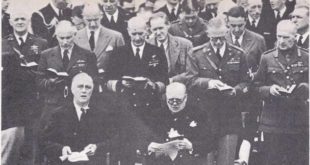Even before the Korean War, the United Nations had proved that it could take effective action to control serious conflicts. It first took such action in the conflict over Palestine. During World War I, the British had ousted the Turks from Palestine. When the war was over, the League of Nations placed that land under the authority of Britain. The British then issued the famous Balfour Declaration, which promised the Jewish people that Palestine would someday become their homeland, but the Arabs of Palestine and the surrounding countries strongly objected to this and year after year passed without the British …
Read More »War in Korea 1945-1953
Although the cold war was the most important fact in the politics of the post-war world, few persons could have foreseen that it would lead to fighting in the small, remote country of Korea. Yet, as small and remote as it was, Korea had a strategic location. It was near three large powers — Russia, China and Japan — and the Japanese said it “points like a dagger at the heart of our country.” The Japanese won control of Korea in the Russo-Japanese War and by 1905 they ruled it as part of their empire. During World War II, the …
Read More »China and Revolution 1912 – 1962
Like Gandhi and Nehru in India, one of China’s greatest leaders, Dr. Sun Yat-Sen, learned from the West as well as the East. Born in 1867 of a Christian family, he received most of his education in Hawaii; while an exile, he lived in Europe, America and Japan. Although Dr. Sun had been educated to be a surgeon, he soon gave up the practice of medicine to lead his people against their Manchu rulers. The Chinese were successful in overthrowing the Manchus and in 1912 they proclaimed their country a republic. Dr. Sun, who became known as the “father of …
Read More »Independence for India 1920 – 1964
Even before the end of World War II, it was clear that Asia and Africa would soon be shaken by a great movement for independence. Everywhere the colonial peoples wanted to be free of the rule of other countries. The British, who controlled more colonies than any other nation, knew that they faced the break-up of their empire. Churchill was opposed to giving up any of Britain’s power. In 1942, he said, “I haven’t become the king’s first minister to preside over the liquidation of the British Empire.” A number of Englishmen shared his view, including some members of the …
Read More »Victory in the Pacific 1941 – 1945
On June 25, 1940, the Japanese war minister said, “The present international situation is developing in a manner advantageous to Japan’s national policy. We should not miss the present opportunity. . . Japan’s national policy was scarcely a secret. It had already linked itself by treaty to the aggressor nations of Germany and Italy – for several years it had been fighting an undeclared war against China. Although Chinese guerrilla forces were fighting back the Japanese controlled most of the Chinese railroads and held such cities as Peiping, Shanghai and Canton. They planned to establish something they called the “Greater …
Read More »A World at War 1939 – 1941
Now the people of Europe began to hear a new sound, a sound that would haunt them throughout the years of war — the wail and shriek of air-raid sirens. At night, the lights of Europe went out and the “blackout” made familiar streets strange places of darkness. Street lamps were left unlit and windows were covered with heavy draperies. Any stray gleam of light might help guide enemy bombers to their targets. Hurrying about their wartime duties, the people of Britain and France began to wonder. They had not wanted war and yet war had come. Why? What had …
Read More »“Peace in Our Time” 1938 – 1939
Czechoslovakia was a country of many peoples. The largest groups were the Czechs and the Slovaks, but in the region called Sudetenland lived 3,000‚000 Germans. Although Sudetenland had never belonged to Germany — it had once been under the rule of Austria — Hitler was determined to “bring the Sudeten Germans home.” The Nazis had been active in Sudetenland for some time and after Hitler took over Austria they became busier than ever. Throughout the spring and summer of 1938, the Sudeten Germans made demands on the Czech government. In Germany, there were threatening troop movements. Hitler also began the …
Read More »Victory in Europe 1941 – 1945
Even before Pearl Harbour, there had been cooperation between the United States and Britain. In August of 1941, President Roosevelt and Prime Minister Churchill met secretly, on a cruiser at sea off the coast of Newfoundland. There they drew up the Atlantic Charter, a document stating the principles on which they based their hopes for a better future for the world. They pledged that neither country would seek more territory. They hoped that, “after the final destruction of Nazi tyranny,” all men in all lands could “live out their lives in freedom from want and fear,” and they called on …
Read More »“My Name Will Stand Forever” 1933 – 1938
Adolf Hitler, stood above the German town of Berchtesgaden, in a large, imposing house in the mountains and stared out a window. It was a fine February day in the winter of 1938 and the snow-covered peaks of the Alps glistened in the clear air. The man at the window seemed not to see the peaceful mountains. Berchtesgaden was close to the border of Austria and he seemed to see beyond the mountains into the heart of Austria itself — an Austria filled with marching troops‚ cheering crowds and the swastika banners of the Nazis. Staring at this vision, he …
Read More »







